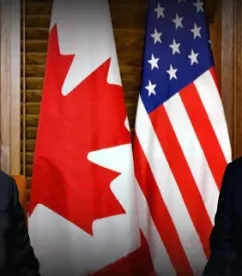There is currently a debate in Canada regarding the pros and cons of the bilateral Safe Third Country Agreement (STCA). When the number of individuals leaving the U.S. to seek asylum in Canada increased in September 2017, questions about the agreement’s sustainability arose.
STCA was established in 2004 between the U.S. and Canada proving that refugees must seek asylum in the first “safe country” in which they arrive. This means that Canada may turn back those seeking asylum who arrive at land ports of entry from the U.S. and vice versa. There are some exceptions; for example, this agreement does not apply to individuals who arrive between ports of entry. In order to discourage individuals from making dangerous crossings between ports of entry, and to limit the number of asylum seekers, Canada has considered amending the STCA so that it would apply to anyone crossing the border. Since 2017, approximately 26,000 people have crossed the land border into Canada illegally – avoiding the strictures of the STCA.
In April 2018, the Canadian government renewed discussions with the U.S. Department of Homeland Security about amending the STCA. Since then, the STCA has become more controversial in Canada. Conservatives still want to limit the number of asylum seekers, but other, more liberal critics are concerned about sending refugees back to the U.S.
The Canadian Immigration and Refugee Protection Act requires a continual review of countries designated as safe third countries to ensure that those countries continue to meet certain humanitarian standards. The Canadian government website states: “Only countries that respect human rights and offer a high degree of protection to asylum seekers may be designated as safe third countries.” In response to the separation of children from their parents at the U.S. southern border, former-Canadian Foreign Minister and now-Chair of the World Refugee Council at Canada’s Center for International Governance Innovation, Lloyd Axworthy, has stated: “Trump policies that separated children from their families at the Mexican border has added to the real sense of unease and opposition to the agreement . . . .” The new U.S. policy of no longer providing asylum in cases of domestic abuse and gang violence also has increased opposition because it is incomparable to Canadian law.
The Canadian Immigration Minister, Ahmed Hussen, reported that the government is monitoring the situation and that Canada “will continue to be a country that is open to refugees and protected persons.” Some observers believe that the ongoing NAFTA discussions and the current tensions between the U.S. and Canada make this an inauspicious moment to reconsider the STCA.




 />i
/>i
